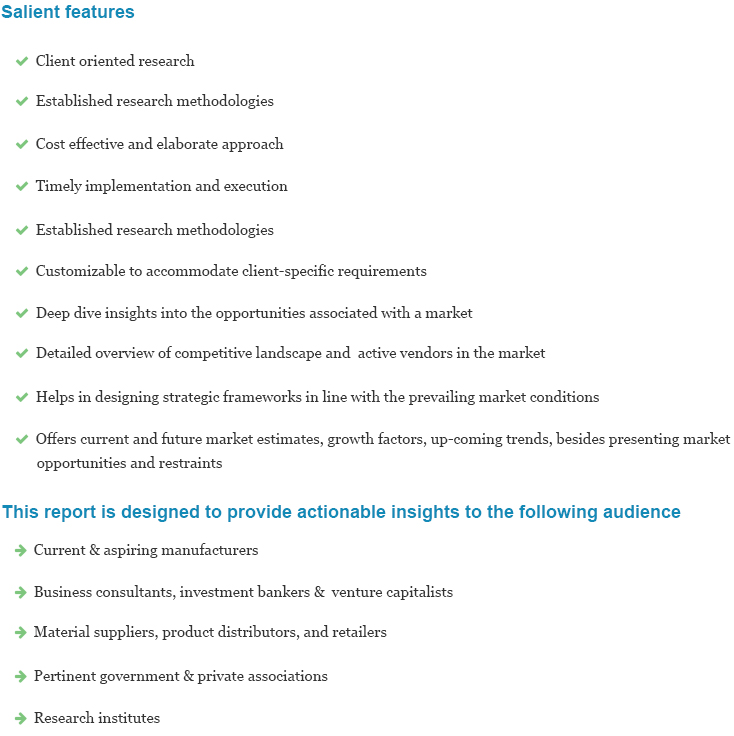
Home Healthcare Device Market Analysis By Product, By Service And Segment Forecast 2015 to 2022
- Published: October, 2017
- Format: Electronic (PDF)
- Number of pages: 70
- Industry: Medical Devices
Industry Insights
Home healthcare device market is expected to witness lucrative growth over the forecast period owing to the increasing prevalence of chronic diseases such as diabetes, respiratory diseases and cardiac disorders. Home healthcare devices are wide range of medical equipment, devices and drugs that are generally used in home for treating diseases and disorders by non-professional care givers such as family members or patient itself. Improvement in technology has made the applications of medical devices simpler and mobile which is expectedto drive the home healthcare devices market over the forecast period. Some other factors which have triggered the demand for these devices are increasing demand for minimal invasive devices, cost effectiveness in treatment of diseases at home rather than visiting hospitals & healthcare institutes, and acceptance of more home healthcare devices globally.
Increasing number of people diagnosed for deadly diseases like diabetics, kidney disease, asthma and cardiac diseases are anticipated to drive the market for home healthcare devices and drugs. Rapid growth in geriatric population base, increasing government support in healthcare, increase in personal disposable income and huge investment in sunk cost are the triggering factors for the market growth over the forecast period. Improvement in technology has bought a revolutionary change in treatment of chronic diseases by making it safer, increasing its effectiveness and making it more convenient in handling by the patients or caretakers.
Product Insights
The global home healthcare device market is bifurcated into type of products/devices and services. On the basis of products, market is again classified into diagnostic and monitoring devices, therapeutic home healthcare devices, home mobility assist devices, and medical supplies. Diagnostic and monitoring healthcare devices are divided into blood glucose monitors, blood pressure monitors, temperature monitors, heart rate monitors, sleep apnea monitors, pregnancy test kits, coagulation monitors, pulse oximeter and pedometers. Therapeutic home healthcare devices is further classified into insulin delivery devices, CPAP devices, nebulizers, intravenous equipment and dialysis equipment, whereas home mobility devices are sub-segmented into wheelchairs, cranes and crutches. Among all these, home mobility devices are commonly useddevices in daily practices by patients. Devices like blood glucose and blood sugar monitors are likely to growth over the next decade.
Services Insights
On the basis of services, market is divided into rehabilitation services, telehealth & telemedicine services, respiratory therapy services, infusion therapy services and unskilled home healthcare services. Respiratory therapy services contributes significant share in home healthcare market owing to the increasing incidences of respiratory disorders. Telemedicine and telehealth services are anticipated to growth at highest rate owing to the increasing usage of technology and active online presence of these devices.
Regional Insights
Regionally, the entire home healthcare market is divided into four main regions namely, North America, Europe, Asia Pacific and RoW. North America dominated the home healthcare products, in 2013. Owing to the increasing investment in R&D by big pharmaceutical companies and availability of sophisticated technology, the market is anticipated to continue its dominance by 2020. Asia Pacific region is considered to be the fastest growing segment over next six years due to increasing awareness about latest technology and growing geriatric population. Emerging economies provide significant growth opportunity for the growth of this market owing to a large potential market which is lying idle and needed to be exploited, in order to capture maximum market share.
Competitors Insights
Some of the key players of home healthcare device market are 3M Healthcare, Abbott Laboratories, F. Hoffmann-La Roche Ltd., Johnson & Johnson Services, Inc., GE Healthcare, Bayer AG, Beckton, Dickinson and Company, Cardinal Healthcare, Gentiva Health Services, Inc., Invacare Corporation, and Medtronic, Inc. to name a few. The market is highly competitive and firms are adopting many business strategies for development of their business.

Choose License Type
- World's largest premium report database
- Transparent pre & post sale customer engagement model
- Unparalleled flexibility in terms of rendering services
- Safe & secure web experience
- 24*5 Research support service
